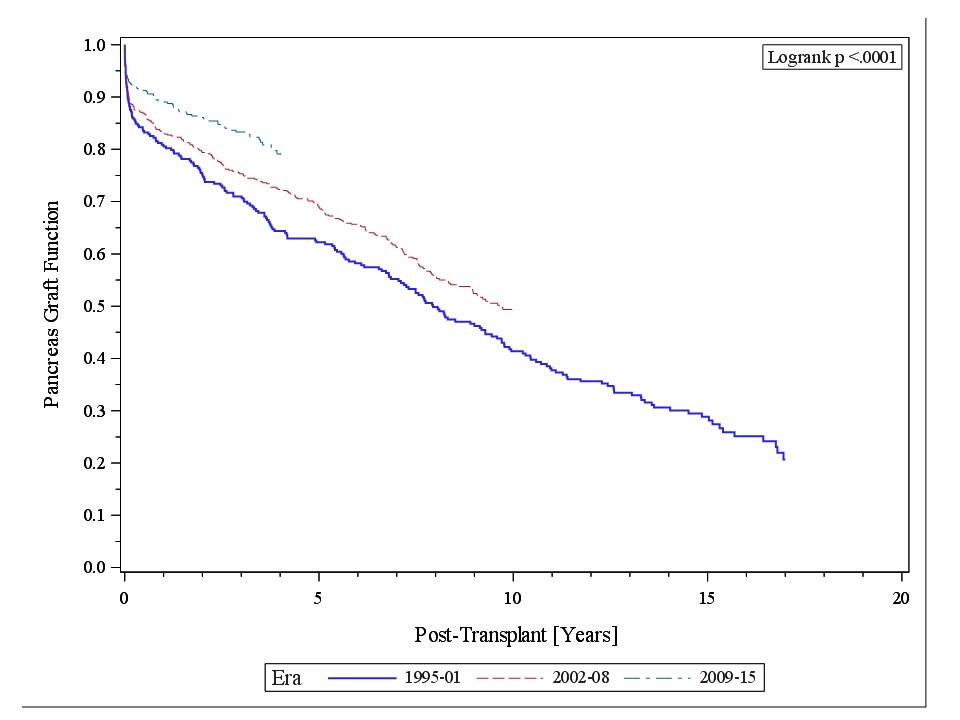2017 - IPITA
This page contains exclusive content for the member of the following sections: TTS, IPITA. Log in to view.
Pancreas Transplantation - Outcomes & Complications 1
5.5 - Simultaneous Pancreas and Kidney Transplant (SPK) – The New Standard of Care for Uremic Patients with Type 2 Diabetes Mellitus (T2DM)?
Presenter: AC, Gruessner, Syracuse, United States
Authors: Angelika Gruessner, Mark Laftavi, Rainer Gruessner
Simultaneous Pancreas and Kidney Transplant (SPK) – The New Standard of Care for Uremic Patients with Type 2 Diabetes Mellitus (T2DM)?
A. Gruessner1, M. Laftavi1, R. Gruessner1.
1Surgery, SUNY Upstate Medical University, Syracuse, USA,
Introduction: While a simultaneous pancreas and kidney transplant (SPK) is now considered standard of care for uremic T1 DM patients, it is not for T2DM (despite similar medical issues). The purpose of this IPTR analysis was to study current SPK outcome in T2DM.
Methods: Between 1/1995 and 12/2015, 1,514 primary deceased donor pancreas transplants in patients with T2DM were reported to IPTR/UNOS. The majority of transplants were SPK (88%) and PAK (9%); Pancreas transplants alone accounted for 3%. This study focuses on SPK outcome. Comprehensive uni- and multivariate statistical analyses for outcome and risk assessment were performed using recipient, donor and technical factors.
Results: In contrast to T1DM, the number of primary SPK in T2DM increased over time. Table 1 shows the distribution by era for the most important characteristics and risk factors.
Era1995-012002-082009-15pN298482542<0.0001Male Recipient6670740.06Age44(8)48(8)46(8)<0.0001% AfricanAmerican142332<0.0001Duration of T2DM22(7)21(8)21(8)0.43% BMI > 28m/kg21931320.0003% on Dialysis8384890.03
A significant improvement over time was noted for SPK patient survival (p<0.0001): at 3-years, from 96.2% (first era) to 98.6% (last era). Risk factors for patient survival were a failed pancreas and/or kidney graft, age over 45 years, and being African American.
Pancreas [Figure 1] and kidney graft function also improved significantly over time (p<0.0001). The rate of early technical failures decreased from 8.4% to 5.7% (p>0.05). The main reason for pancreas as well as kidney graft failure was dying with a functioning graft (> 40% of all causes for graft failure). Recurrence of T2DM was rarely noted (<1% of failures) and only in patients with massive posttransplant weight gain. Donor age > 30 years of age was the most influential risk factor for technical complications and pancreas graft failure. Of note, overweight (but not obesity) was also a risk factor for technical complications. Maintenance immunosuppression with Tacrolimus in combination with MMF improved graft function.
Conclusion: Patient and graft outcomes after SPK in T2DM have significantly improved over time. As in T1DM, SPK should also be considered standard of care for insulin-dependent, uremic T2 diabetics with the caveat that weight gain has to be avoided after transplant.
Important Disclaimer
By viewing the material on this site you understand and accept that:
- The opinions and statements expressed on this site reflect the views of the author or authors and do not necessarily reflect those of The Transplantation Society and/or its Sections.
- The hosting of material on The Transplantation Society site does not signify endorsement of this material by The Transplantation Society and/or its Sections.
- The material is solely for educational purposes for qualified health care professionals.
- The Transplantation Society and/or its Sections are not liable for any decision made or action taken based on the information contained in the material on this site.
- The information cannot be used as a substitute for professional care.
- The information does not represent a standard of care.
- No physician-patient relationship is being established.
Contact
Address
The Transplantation Society
International Headquarters
740 Notre-Dame Ouest
Suite 1245
Montréal, QC, H3C 3X6
Canada
